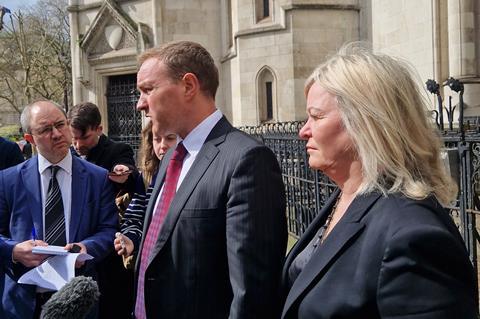Two former traders jailed over the manipulation of key benchmark interest rates today had their convictions upheld by the Court of Appeal.
The cases of Tom Hayes and Carlo Palombo were referred to the Court of Appeal by the Criminal Case Review Commission. Following a ‘wide-ranging and complex’ review, the commission said there was a ‘real possibility’ the court could overturn both convictions.
The referral followed the US second circuit Court of Appeal decision in Connolly and Black, clearing two other traders convicted in 2022. Outstanding charges against Hayes in the US were also dropped.
Hayes, 44, was convicted in 2015 of multiple charges of conspiracy to defraud in relation to the London Inter-Bank Offered Rate (LIBOR). He was sentenced to 14 years’ imprisonment, later reduced to 11 years. Hayes served five and a half years and was released in 2021. He has always maintained his innocence.
Palombo, 45, was convicted of conspiracy to defraud by rigging the Euro Interbank Offered Rate (EURIBOR) benchmark interest rate between 2005 and 2009. He was sentenced to four years’ imprisonment following a 2019 trial at Southwark Crown Court.
Following a three-day hearing before Lord Justice Bean, Lord Justice Popplewell and Mr Justice Bryan earlier this month, Lord Justice Bean gave a summary of the court’s decision in the Royal Courts of Justice this morning before handing down the full judgment.

Hayes and Palombo have 14 days to apply for permission to appeal to the Supreme Court.
Lord Justice Bean told the court: ‘Connolly and Black is not, and could not be, relevant to the issue of whether in an English criminal trial the meaning of LIBOR is a matter of law for the judge or of fact for the jury. The CCRC reference does not suggest that this was a basis on which this court might reconsider its five previous decisions.
‘It is also, in any event, without merit given that the LIBOR and EURIBOR codes were binding contracts, resembling legislation.’
A Serious Fraud Office spokesperson said: ’The Court of Appeal’s judgment is clear that these convictions for fraud are still as relevant today as ten years ago. No one is above the law and the court has recognised that these convictions stand firm.’
Speaking outside the court following the judgment, Karen Todner, Hayes’ solicitor, said: ‘We’re very disappointed by today’s decision. We are going to apply to go to the Supreme Court, and we won’t give up. We’re still going to fight. It goes on. It has been going on for eight years and we will continue, we are not going to give up.’
Asked what she thought of the outcome, Todner said: ‘We haven’t seen the full judgment, but it does not actually seem to engage with the points that were raised and didn’t seem to reflect the hearing that we had for three days last week. It seems to be a completely different judgment.
‘But we will read the judgment in full, we will make an application to go to the Supreme Court and I am really hoping that we will get there. This case deserves to be heard by the Supreme Court.’
Hayes said it was ‘time to be heard at the highest level’ at the Supreme Court. He added: ‘All I can hope is that they allow us to have that opportunity at the very least.’
Hayes said he was ‘used to losing’ adding: ‘I am a fighter, not a quitter as are my legal team and other traders involved here. I dearly hope they say this is an issue that is serious enough that it can be heard by the highest court.
Dr Susan Hawley, executive director of Spotlight on Corruption, said the case ’should provoke some real soul searching about whether the right people are ending up in the dock in corporate crime cases.
’There are real dangers of going after lower-level managers and traders rather than senior executives. It’s essential that there is now a really conscious shift in prosecution strategy to go after senior executives, and far greater use of whistleblowers to gather the evidence against those at the very top of organisations.’
This article is now closed for comment.



























9 Readers' comments